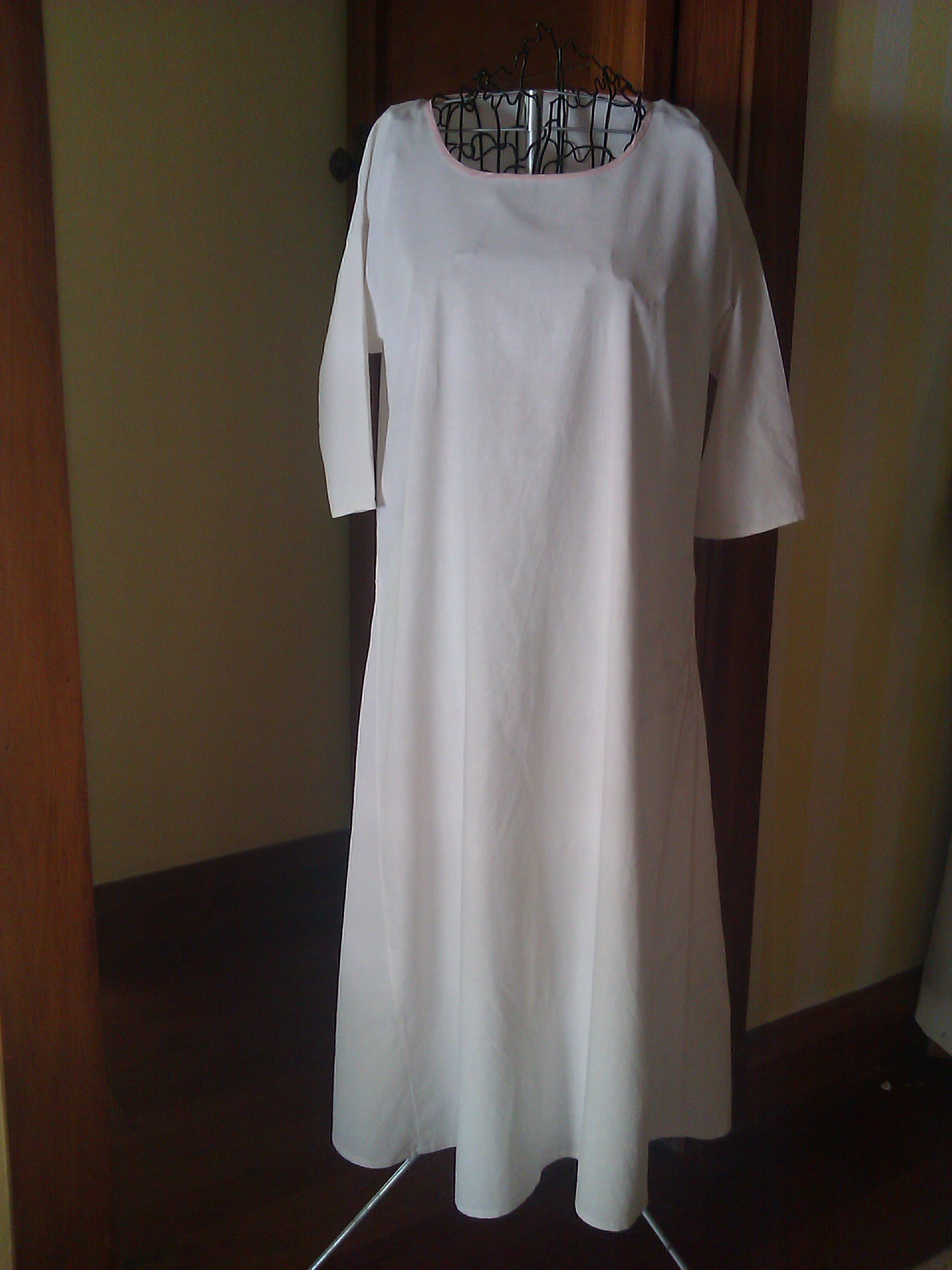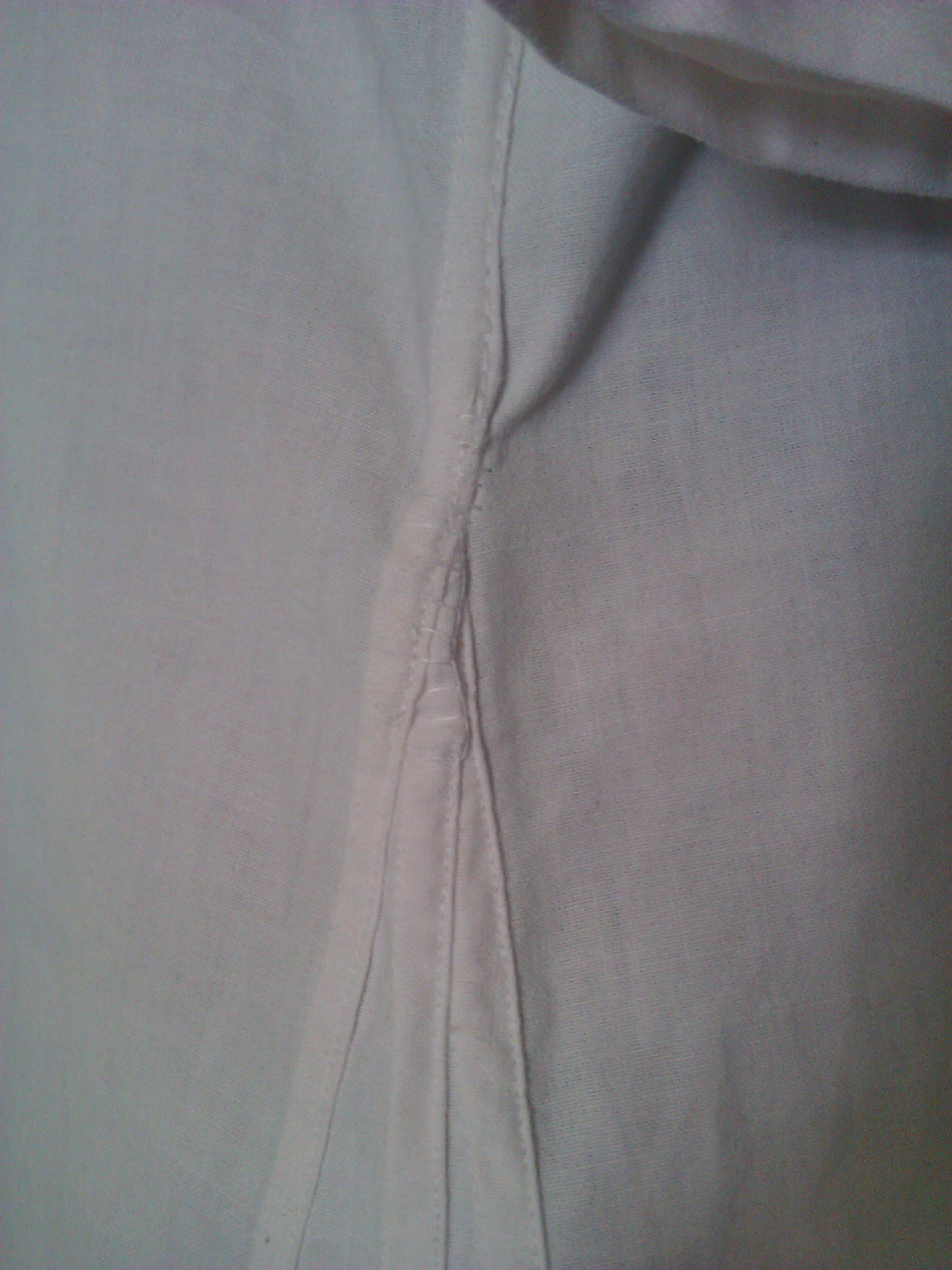You know how it is. You lurk for a while, then you comment for a while, and then you decide you just can’t resist and you get involved. So it was with me and the Historical Sew Fortnightly. In 2013 I lurked, in 2014 I commented, and now in 2015, I plan to take part. Ths year it’s been revamped as the Historical Sew Monthly, but I still don’t think I’ll manage all twelve challenges. Small but sustainable, that’s my beginner’s ambition.
I didn’t want to make anything that I couldn’t wear in daily life, but being æsthetically eccentric, that’s a wide range. Not as wide as a crinoline, though. I do have some sense of practicality.
So I decided to start with a simple chemise or shift, the foundation of Western clothing for centuries, and something which would fill the gap in my wardrobe marked “light summer nightgown”.
I give you, therefore, my first HSM project: The Igor Thift!
(Apologies for the exoskeletal dress-form – she’s in shape, but I haven’t got around to covering her yet.)
Challenge: Foundations (Jan)
Fabric: an old sheet, feels like mostly cotton
Pattern: I used marquise.de’s 18th century chemise instructions
Year: eighteenth century
Notions: thread, bias binding
How historically accurate is it? Somewhat? The pattern is all good; the fabric is possibly part man-made fibre, but “old sheet” is a historically accurate fabric, in my opinion 🙂 The binding is of uncertain age, but it is bias binding, which is historically inaccurate, as far as I know.
The construction is a bit mixed: I used historically accurate flat-felled seams, but they were sewn partly by hand and partly by ye notte quite olde enoughe hand-crank sewing machine (post WWII Japanese Singer knock-off).
The finished shift includes lock-stitch (machine), back-stitch, running stitch, whip stitch and even, embarrasingly, blanket stitch. This, combined with the fact that the Caped Gooseberry was reading me Terry Pratchett’s The Fifth Elephant as I worked, caused me to dub this the Igor Thift. Alas, my thtitcheth stitches are not quite Igor-worthy in their tininess, although the hand-crank does up to 30 stitches per inch, should anyone be mad enough to want it to.
Hours to complete: embarrasingly many. Perhaps as many as 20? The whole process was slowed down by not deciding it was too wide until I had already sewn the side gores on. So I tore part of it off, cut two new side gores and started again on that side. (The pattern suggests adding 20cm ease – I should have done this before halving my maximum circumference, not after.) I did two side gores on each side, attached to the body along the hypotenuse for that isosceles-triangle effect.
First worn: as a nightdress for a trip to the Coromandel in the last week of January. Light and comfortable.
Total cost: time and energy. The sheet was discovered in an archaeological dig of the rag cupboard, and the binding was inherited from my grandmother’s stash. So it could also be considered as an entry for March (Stash-Busting) were it not against the rules to enter one item for multiple challenges.
What I Have Learned From This Project:
1) Even with simple things, it pays to plan ahead. Especially where one is going to have three seams merging into one.
2) It’s all right for things to not be perfect.
I had originally planned to do about six items, each of which would work for two consecutive challenges. But that was when I thought Stash-busting was February and Colour Challenge Blue was March, rather than the other way around. I may still try to do six items which between them cover all twelve challenges, as I have an idea for something which will work excellently for both Blue (Feb) and War & Peace (Apr). Opinions? Advice?




I love it 🙂 It’s much more figure flattering than my own “flour sack with sleeves” chemise, though mine was made from a Simplicity pattern and is undoubtedly very far from historically accurate. It worked well under my corset for the Ren Faire whenever I wore it, though, which was the point.
I also love that you named it after a Discworld character – I love the Vimes subseries (including The Fifth Elephant, which I have.)
Thanks for stopping by my blog today!
Glad you like it! I think the flatteringness is more to do with lighting than any actual lack of flour-sackness, though 🙂 I have heard the Simplicity patterns tend to have quite a lot of wearing ease.
I just wish I’d had something like this to wear at nights when we went back to PNG for a month a couple of years back – it turns out I have acclimatized to NZ after all!
Wait, is this my Deborah, from growing up in PNG? The one who introduced me to Terry Pratchett with The Truth back in middle school? I remember you got married a few years back, but we’ve been out of touch so long that I’ve lost track of your new last name. I looked for an email address on this site and didn’t find one, so I’m plopping this out there in the comments and hoping I’ve not got some stranger, because that will be awkward… 🙂
It is I! I shall send you my email, as yours is helpfully displayed 🙂
Free time is a historical concept (or, more congruently, an historical concept). Glad you have a little!
I’m glad I have some too! I just wish I knew what your first sentence means 🙁
The “how long did this take you” is always my least-favourite part of filling out the questions too… I never remember, and when I think of it, I never want to remember! Everything takes so long! (mind you, some of that is wandering around, getting distracted by other things, putting new music on, finding slippers, fingering fabrics that are totally not part of the current project and daydreaming about what they’ll become…)
Absolutely! I feel like I should just be able to put “embarrassingly long” on everything. I mean, it takes me hours just for the cutting out!
My other bug-bear is forgetting to take in-progress photos, although given the quality of photos I produce, the world’s not missing much.